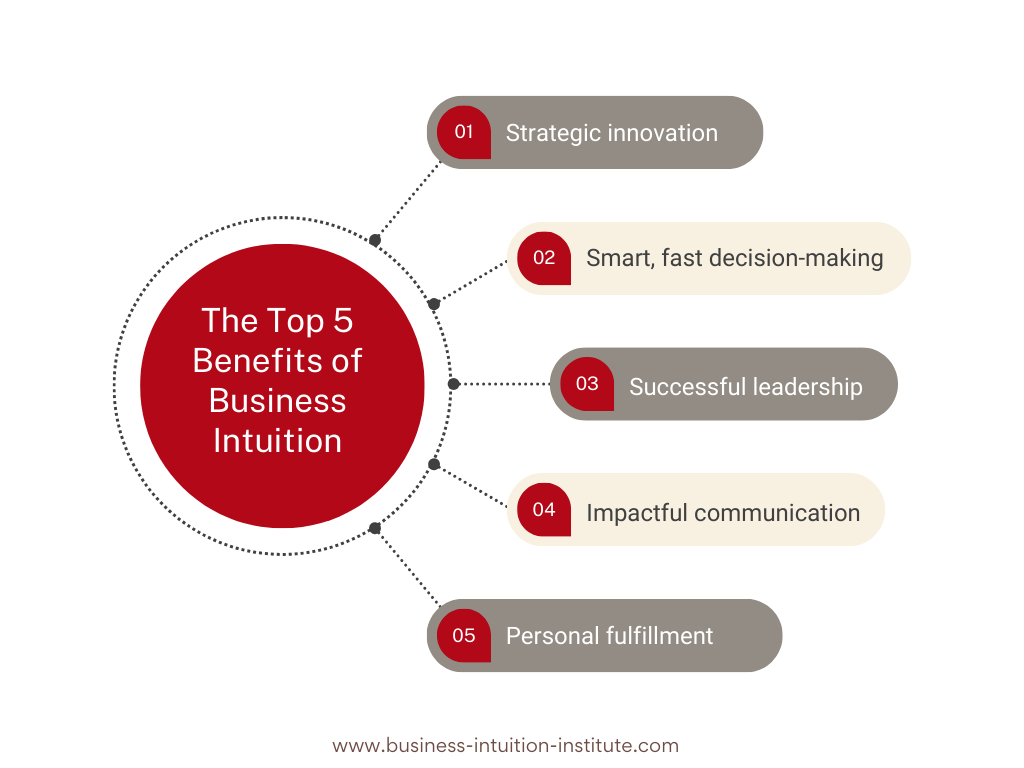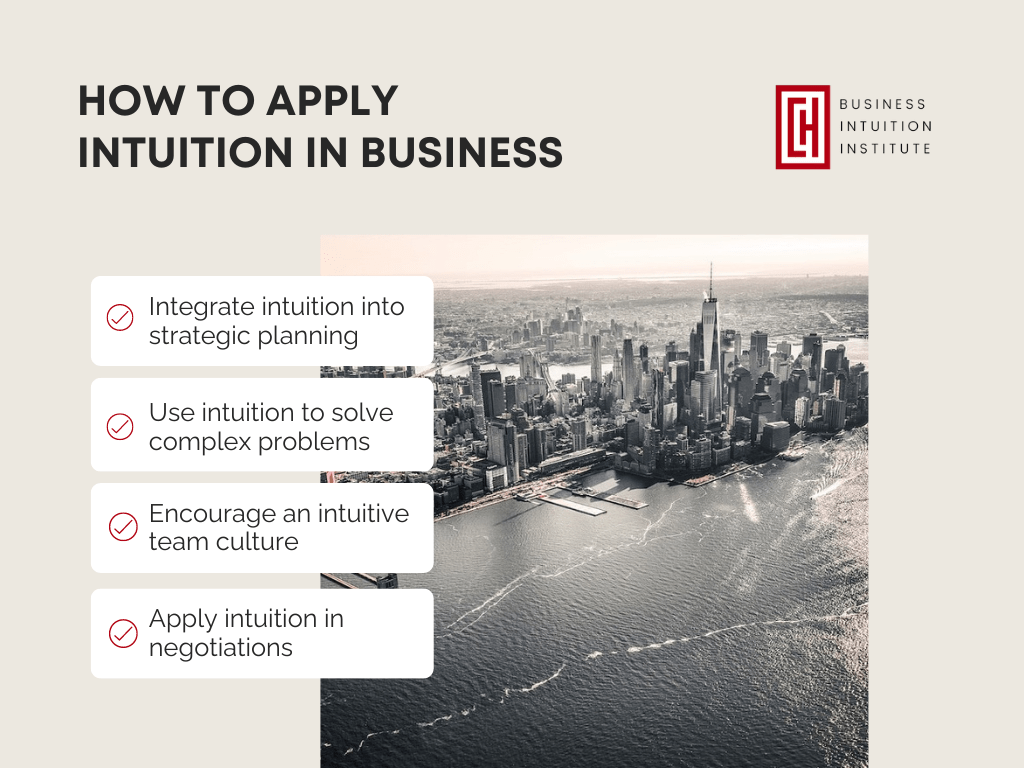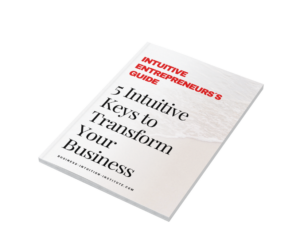Business Intuition:
Definition, Development, Best Practices
INTUITIVE GUIDE FOR ENTREPRENEURS AND EXECUTIVES
In today's rapidly evolving business landscape, business intuition is a key concept in entrepreneurship and leadership. Intuition in business is the art of making decisions in the complex, ever-changing business landscape. It's more than just a gut feeling; it's an informed sense that guides leaders through uncertain terrain. Bridging the gap between the subconscious and the rational mind, business intuition is a tangible tool for strategic planning, innovation, leadership, and decision-making.
The benefits of harnessing business intuition are significant. It serves as a compass in navigating the ambiguities and rapid changes in the business environment. Intuition aids in quicker, more effective decision-making and fosters innovative thinking—two elements in staying ahead in the competitive market. Developing and using intuition in the business environment requires a blend of experience, awareness, and observation.
In this article, we will delve into the concept of business intuition – what it means, its benefits, and how you can improve and apply it in business. You will learn how by incorporating mindfulness practices and intuitive exercises, you can integrate intuition into various aspects of business, from strategic planning and implementation to fostering an intuitive corporate culture and negotiating with partners.

What Is Business Intuition?
Business intuition is the ability to access your subconscious for business purposes, which enhances creativity, innovation, and your power to handle change. Business intuition is the bridge between your subconscious and rational mind; it connects the rich field of information in your subconscious to your business thinking. By picking up subtle cues and unapparent connections, it helps you to succeed at strategic planning, entrepreneurship, leadership, and decision-making. It is rooted in your personal experiences, know-how, and subconscious field of information.
Intuition in business does not replace logical problem solving; rather, it supplements it and takes it to higher levels. Problem solving can be viewed as a double-looped process in which rational analysis is loop one and intuitive analysis is loop two, but it is intuition that oversees the two loops and decides when to use one or the other.
Einstein said that the intuitive mind is a sacred gift and the rational mind is its faithful servant. In developing his theory of relativity, Einstein relied on intuitive mental images. He used left-brained analysis to authenticate intuitive insights.
Why Intuition in Business Is Important Today?
According to a study in Harvard Business Review, 68% of business leaders don't harness the creative power of intuitive intelligence. They rely on concrete data, logical reasoning, and rational analysis when making significant decisions. However, business intuition is a powerful tool in disruptive and uncertain times.
Here's why business intuition is important:
Quick Thinking: When time and data are insufficient, intuition allows leaders to make swift decisions. Speed can be crucial in responding to unexpected market changes or crisis situations.
Handling Ambiguity: In uncertain times, entrepreneurs and business leaders are frequently confronted with ambiguous situations, e.g. deciding which products or services to focus on. Intuition helps navigate this ambiguity by relying on subconscious cues and experiences to guide decision-making.
Emotional Intelligence: Intuition is closely linked with emotional intelligence. In uncertain times, being able to read and respond to the emotions of employees, customers, and other stakeholders is vital for maintaining trust and morale.
Risk Assessment: Intuition aids in assessing potential financial risks and investment opportunities, enabling business owners to make strategic choices with partial information. Most investment decisions are made in a volatile and unpredictable market landscape. Intuition is a compass that guides investors through the landscape.
Benefits of Business Intuition
Business intuition is a remarkable asset that extends its benefits to various aspects of business growth and success. In many business disciplines such as strategic development, complex decision-making, and communication, harnessing intuition can bring transformative advantages to entrepreneurs and organizations.
Here are five top benefits of business intuition:
1. Strategic innovation
2. Smart and fast decision-making
3. Successful leadership
4. Impactful communication
5. Personal fulfillment

1. Strategic Innovation through Intuition
Using intuition for business results in thinking outside the box and taking risks that lead to breakthrough solutions. Business intuition plays a critical role in strategic development. It helps leaders make holistic and innovative decisions. By tapping into your intuition, you can gain a deeper understanding of trends and markets. You can develop future-proof strategies and business models. Intuition is the silent ally that empowers us to see beyond the data and connect the dots in unique ways.
2. Intuition Supports Fast and Complex Decision-Making
Business intuition can help you to make successful decisions quickly and confidently. When leaders tap into their subconscious and rely on gut feeling, they arrive at the right choice. This helps in ambiguous situations such as thinking on your feet during a negotiation or influencing a prospect during a sales call. Intuition in business opens your mind to consider a broader range of factors. It can help you to redefine problems and improve the quality of your solution set.
3. Intuitive Leadership Brings Success
Intuition can help you and your team to identify new opportunities and innovative solutions. By being attuned to the surrounding signals, you can identify opportunities. This can help organizations to stay ahead of the competition and innovate more effectively.
Business intuition allows entrepreneurs and managers to understand and solve problems, and the solutions can be verified with conscious reasoning and experimentation. That extends to problems of human relations and motivation. Leaders can envision new strategies and methods of inspiring employees. New human resource policies can improve commitment. Turnover rates can be reduced. Teams can use business intuition to improve trust and collaboration. This can help team members tailor their approach, offer personalized service, and develop long-term client relationships.
4. Impactful Communication with Intuition
Intuition can help you to develop empathy and emotional intelligence, which are essential for building trust and connection with customers, employees, and stakeholders. You can use intuition in a negotiation to better understand your counterparties’ motives and desires. You can use it to find investors and partners who are a good match in terms of values, culture, and goals. You can better understand their perspectives and so strike better deals.
In his classic Emotional Intelligence: Why It Matters More Than IQ, Daniel Goleman defines emotional intelligence as being made up of five components: empathy, communication, self-awareness, self-regulation, and motivation. Intuitive intelligence is necessary to develop and navigate each. For instance, how do we handle ourselves in a new technological or market environment? Is rational analysis even possible? How do we understand customers or counterparties in a negotiation?
5. Fostering Personal Growth and Fulfillment through Intuition
Intuitive entrepreneurs find personal fulfillment easier. We all have doubts in the face of rapid change. Every entrepreneur and CEO is concerned about their place in the new economy. Using intuition, you can better redefine yourself and find your values and mission. You can create a business that reflects your unique perspective and purpose.
Navigating Challenges on the Business Intuition Path
Business intuition presents a set of challenges that require astute handling. To effectively leverage this intuition, entrepreneurs and executives face several challenges that must be skillfully navigated.
Here are the 5 top challenges to utilizing business intuition:
1. Distinguishing Intuition from Impulse: One of the challenges is differentiating between a genuine intuitive insight and impulse. Intuition is often based on patterns and experiences, whereas impulses might be reactionary and not grounded in experience or evidence. Effective leaders learn to recognize this difference through self-reflection and awareness.
2. Balancing Intuition with Data: In today's data-driven world, relying solely on intuition can be risky. The challenge lies in balancing gut feelings with hard data. Successful business leaders use data to inform their intuition, ensuring that their instincts are backed by facts and figures.
3. Overcoming Bias: Intuitive decisions can be skewed by personal biases, leading to choices more aligned with pre-existing beliefs than business fact and logic. Seeking a diversity of viewpoints, engaging with a team and intuitive business coach can help.
4. Building Trust in Intuition: Trusting this inner voice, especially in high-stakes situations, can be challenging. Building a track record of successful intuitive decisions can help in gaining confidence and trust in one’s business intuition.
5. Communicating Intuitive Decisions: Convincing others to follow an intuition-based decision, particularly in a corporate environment that values data and rationale, can be difficult. Leaders must learn to articulate their intuitive insights in a way that resonates with stakeholders, often by linking these insights to data and observable trends.
How To Improve Your Business Intuition?
Developing and honing business intuition is not only possible but also essential for making smart decisions in today's fast-paced business environment.
Here are some practical tips and techniques to improve your intuitive abilities:
- Mindfulness practice and meditation
- Intuition training exercises
- A business intuition journal
- Reflection on past business experiences
- Expansion of your knowledge base
- Cultivate Emotional Intelligence
- Trust and Act on Your Intuition
Let’s explore these best practices in detail:
Mindfulness Practice: Engage in mindfulness practices to sharpen your focus and awareness. Create time for undisturbed thinking. This quiet time is crucial for developing deeper insights and allows your subconscious mind to process information, contributing to stronger intuitive decisions.
Ensure you get a restful night's sleep and consider incorporating meditation or moments of mental relaxation into your routine. Fatigue and confusion can impede your awareness of intuition, as your brain requires rest to function effectively. Even a brief five-minute downtime during your day can rejuvenate your brain and enhance intuitive clarity.
Intuition Training Exercises: Engage in exercises specifically designed to strengthen intuition.
1. Case Study Analysis: Regularly analyze diverse business case studies that don't provide clear-cut solutions. After studying a case, predict the outcome based on the given information before reading the current resolution. This practice helps you draw on your business understanding and instincts.
2. Scenario Planning: Engage in scenario planning exercises where you consider various future scenarios for a particular industry or company. Develop strategies for each potential future which will help you hone your ability to anticipate and intuitively react to business changes.
3. Market Trend Prediction: Regularly observe and analyze market trends, then make predictions about future movements. Afterward, compare your predictions with actual outcomes to refine your intuition and understanding of market dynamics.
Business Intuition Journal: Keep a journal where you record various business decisions you make, the intuition you relied upon, and the outcomes. Reviewing this journal can provide insights into how your intuitive decisions play out in real life, allowing for better calibration of your instincts.
Learn from the Past: Reflect on your previous decisions, both decisions that turned out well and those that didn’t, in the course of which you've used your intuition. Analyze what you felt and thought at the time and what you learned from each experience.
Embrace your mistakes and analyze them to understand where your intuition led you astray. Learning from failures can be a powerful way to calibrate your intuitive instincts.
Study significant business successes and failures throughout history. Try to understand the context, decisions made, and the intuition leaders might have used.
Assessing hindsight can sharpen your ability to use intuition effectively in foresight.
Expand Your Knowledge Base: Stay informed about your field and market trends. The more you know about your industry, the more context you'll have to back up your intuitive feelings, making them more reliable.
Additionally, engage in learning across different fields outside traditional business disciplines. Insights from psychology, sociology, or even art can provide new frameworks for thinking and enhance your intuitive skills.
Cultivate Emotional Intelligence: Being in tune with your emotions can significantly enhance your intuition. Emotional intelligence can provide crucial context in decision-making processes, allowing your intuition to be more informed and nuanced.
Trust and Act on Your Intuition: The more you trust and act on your intuition, the more you'll be able to refine and trust it. Start with small, low-stakes decisions and gradually build up as you become more confident in your intuitive abilities.
Developing business intuition is crucial for effective decision-making in the dynamic business world. By engaging in mindfulness, practicing intuitive exercises, maintaining a business intuition journal, reflecting on experiences, and broadening your knowledge, you can significantly improve your intuitive skills, leading to smarter and more informed decisions.
Balancing Business Intuition and Analysis
Balancing business intuition and analysis harnesses the strengths of both instinctive understanding and data-driven decision-making, leading to brilliant strategies.
The balance between intuition and analysis is achieved by recognizing the value of each approach and understanding when to rely more heavily on one over the other. For instance, in the early stages of concept development or when responding to unprecedented situations, intuition might take the lead. However, as ideas and strategies become more defined, data and analysis should play a more significant role in refining and validating these concepts.
In his book Zen and the Art of Motorcycle Maintenance, Robert M. Pirsig contrasts creative or Zen thinkers with rational thinkers, who are good at motorcycle maintenance. We can balance yin and yang, intuitive and rational, by applying intuitive methods. Rational solutions found scientifically need to be explored and exhausted but balanced with business instinct and intuition.
As James March and Herbert Simon point out in their seminal work on management, Organizations, reason is bounded by our lack of knowledge of the future, of payoffs, of probabilities of outcomes, and of yet-to-be-discovered solutions. To overcome bounded rationality, we can tap into the unbounded world of the subconscious, in which all solutions are possible: the light bulb, the airplane, and small telephones that transmit through waves.
How to Test Your Intuition in Business?
If you want to test your business intuition, consider mixing self-reflection, practical experimentation, and feedback. Here’s how:
Reflect and Record Predictions. The first step to test your intuition in business is to reflect on your gut feelings. Topics might include market trends, customer preferences, potential investments, or product innovations. Document your intuitions in a journal. Be specific about what you feel will happen and why. This process not only helps in tracking your intuitive insights but also helps in understanding the patterns in your thinking and decision-making processes.
Conduct Small Experiments. Once you have recorded your intuitive insights, design small experiments to test them. For example, if you have a hunch that a certain product or service will be well received by a particular audience, try a targeted marketing campaign on a small scale. The experiments should be designed in a way that measurable results can validate or challenge your intuition. The intuitive approach helps in minimizing risks while allowing real-world testing of your gut feelings.
Seek Feedback and Analyze Results. After experiments, it's important to analyze results and get feedback. Compare the outcomes with your initial predictions and discuss these with mentors or peers. This offers new perspectives and refines your intuition. Regularly reviewing and reflecting on the outcomes of your experiments will sharpen your business intuition over time, making it a more reliable tool in your decision-making arsenal.
How to Apply Intuition in Business?
Applying intuition involves trusting your gut feelings for strategic planning, creative problem-solving, fostering an innovative team culture, and effectively navigating negotiations with business partners.
1. Integrate Intuition into Strategic Planning
For your next strategy session, actively engage your intuition to anticipate future market trends and identify innovative opportunities. Take a moment to trust your gut feelings about where your product market or the financial markets are heading or what the next big thing could be. Consider scenarios that might not yet be evident in current data or trends. This practice can lead to proactive and forward-thinking business strategies that keep you ahead of the curve.
2. Use Intuition to Solve Problems
Apply your intuition to solve complex problems. Often, intuitive insights can lead to creative solutions that might not emerge from purely analytical thinking. Incorporate mindfulness techniques into your decision-making process. Mindfulness can clear your mind and help you tap into your intuitive thoughts more effectively, especially when facing complex business challenges.
After making a decision based on intuition, reflect on the outcome. Was the intuition correct? What can you learn from this experience? This reflection can help you fine-tune your intuitive skills.
3. Encourage an Intuitive Culture
Foster a playful, imaginative business environment in which employees feel comfortable sharing their intuitive insights. This can lead to a more collaborative and innovative workplace, where diverse perspectives contribute to better decision-making.
4. Apply Intuition in Negotiations
When negotiating with business partners, let your intuition guide you in reading the room and understanding their perspectives. Business instinct helps in quickly sensing their responses, adapting your strategy, and making decisions that align with both your business objectives.

Examples of Business Intuition
Among the many examples of great business intuition are Thomas Edison, Nikola Tesla, Steve Jobs, and Bill Gates. One example concerns Jim Burke, the CEO of Johnson and Johnson during the 1980s, and his handling of the Tylenol crisis.
In the 1940s Johnson and Johnson was among the first corporations to adopt a socially responsible credo. The credo says that the firm’s first responsibility is to doctors and parents who use their products, then to employees, then to communities, and last to stockholders.
In 1982, J&J was faced with a nightmare. A serial killer injected cyanide into the capsules of one of the firm’s most famous products, Tylenol, while the bottles were on store shelves. The murders created widespread hysteria.
Tylenol’s market share fell from 35% to 8% in a matter of weeks. Experts and consultants told Burke that the brand was finished and that J&J’s McNeil Labs Division should kill it. But Burke listened to his business instinct rather than to the consultants. His business instinct told him to follow the credo.
J&J recalled every single bottle of Tylenol, 31 million of them, offering to replace them all, at a cost of $330 million in 2024 dollars. Listening to his intuition and fulfilling the J&J Credo, Burke put the stockholders last in the short run and did what was socially responsible. In doing so, he saved the Tylenol brand and maximized profit in the long term.
The Future of Intuition in Business
In the age of AI and technological advancement, the role of business intuition is increasingly significant. As artificial intelligence systems handle more data-driven and analytical tasks, the unique human ability to intuitively grasp complex situations and discern subtle nuances becomes a critical asset.
The future of business will see a synergistic partnership between AI's analytical prowess and human intuition. This combination will be vital for navigating uncertainty, innovating, and making decisions in areas in which data is incomplete or new. AI algorithms need time to learn effectively. Intuition will also play a crucial role in understanding and predicting human behaviors and market trends.
Moreover, in an era in which emotional intelligence and human-centric approaches are increasingly valued, business intuition is essential for building and maintaining strong customer relationships and creating products and services that resonate on a deeper, more personal level with consumers.
As AI continues to evolve, it may also begin to mimic certain aspects of human intuition, learning from patterns of human decision-making. However, the innate human capacity for empathy, ethical considerations, and holistic understanding will ensure that business intuition remains an irreplaceable element.
AI cannot replace the creative power of intuition. In the coming years, left-brained, analytical thinking will become a commodity because AI will do it better and cheaper. Competitive advantage will arise from right-brained, intuitive thinking, and creativity.
What the Business Intuition Institute Can Do for You?
At the Business Intuition Institute, we help entrepreneurs and executives to transform their businesses and lives with intuitive intelligence.
Intuitive business coaching will help you and your team to develop intuition with respect to strategic planning, innovation, leadership, and a mindset shift. We can introduce playfulness, creativity, and fun, which generate intuitive thinking, into your business culture.
Join Our Free Brainstorming Session!
We invite you to a complementary brainstorming session to accelerate your growth and success. Book your intuitive call at https://www.business-intuition-institute.com/calender
Business intuition is your bridge to brilliant solutions.
Popular Articles
Newsletter
Business Intuition Guide






